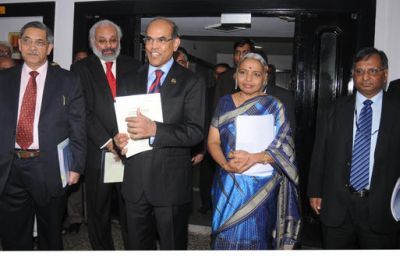 | « Back to article | Print this article |
'Women have to accept that men are as smart as them'
Kalpana Morparia, CEO, JP Morgan
'I do not believe that there is a glass ceiling. This is particularly true in financial services in India. That is the sector that I can speak about with some authority, having spent 36 years of my career in this industry. I didn't feel it at all in my 36 years. I say it is a myth.
I don't believe that organisations in the Indian financial sector have done anything which could discourage women from occupying the C-suite. In fact, some of them have actively adopted policies that would encourage them.
I do find that women representation in the manufacturing sector tends to be low but in the services sector it is pretty high; in the financial sector it is perhaps higher.
I tend to find that at the entry level, the number of women in the workforce is well-balanced. Not quite 50-50 but women could comprise anywhere from 35 to 40 per cent. Sometimes, women themselves make a trade-off of work-life at their child-bearing and child-rearing stage. They want to take a career break.
Click NEXT to read more...
'Women have to accept that men are as smart as them'
That is when, at mid-level, many women drop-off the map. When women join back, they need to be helped on by people-friendly practices. I am not saying such breaks will be given across the board.
Merit will be a criterion of how much to give. HR plays a role in creating policies which will drive an inclusive agenda.
These days corporations have much more people-friendly HR policies. Now women tend to benefit a lot from these, but there will be some men who want to take a sabbatical who will also benefit.
They are looking at encouraging support systems and the overall environment to make it more facilitative towards people with families.
Click NEXT to read more...
'Women have to accept that men are as smart as them'
For example, identifying creches where they can keep their children. Companies could also manage overall activities around their children, either by conducting it themselves or empanelling third-party providers.
Today, employers are far more encouraging when it comes to giving career breaks for up to one year in the child-bearing age. This allows women to come back and pick up their career progression from where they had left.
Despite all the noise we make around it, particularly in the private sector, merit remains the key criteria that determines hiring, assignments, progression and assignments. Organisations pride themselves on the diversity they have achieved.
You can encourage by offering certain facilities or encourage in terms of mentoring, creating networks for women to get together and share experiences.
I have seen it happening in MNCs in India and I am sure it is a question of time before Indian companies do it too. When I mention mentoring, I have seen mentoring irrespective of the person's gender.
Click NEXT to read more...
'Women have to accept that men are as smart as them'
Indian women are also at an advantage compared to their Western counterparts. We have domestic help, a whole lot of family support systems. I have seen so often parents and parents-in-law uprooting themselves and shifting just to make sure the daughter does not need to interrupt her career.
What will it take to finally break the glass ceiling? We should realise, the more we underscore it, the greater disfavour we do to ourselves, as women.
We don't talk about glass ceilings when it comes to getting admission in our academics. In my 36 years I have not come across a single instance where someone has complained to me that their growth has been stinted because she was a woman.
One question which will put your mind to rest about whether the organisation has a glass ceiling or not is to ask, 'Is this organisation merit-based'? If it is, then the ceiling won't be there.
Click NEXT to read more...
'Women have to accept that men are as smart as them'
A number of people ask me that what is it that my earlier organisation, ICICI, did differently to nurture the women in the senior management. The fact is we did nothing differently. That is why women thrived in the organisation.
Would you like to get your job because there was some sort of a quota? Women can compete with men on merit.
The minute there is a quota then merit gets undermined and in fact, can make the woman feel inferior. Women I know, don't like being perceived like that.
Women should revel in the fact that we can dress well in so much more colours than men. One a serious note, we do bring in a different style of leadership. So far as the entire work ethos is concerned, women have to accept the fact that men are just as smart as them!'
Click NEXT to read more...
'Women have to accept that men are as smart as them'
Shyamala Gopinath, former deputy governor of the Reserve Bank of India
'The entry into the Reserve Bank of India (RBI) is through a highly competitive exam and interview. This ensures that the recruitment is objective and unbiased. Once you have entered, the journey up the hierarchy is based on transparent policies.
This is different from organisations where the trajectory of promotions is not clearly laid down; as a result, many liken the rise to the top as weaving through a 'labyrinth'.
However, certain stereotypical perceptions about women do persist, though not widespread. Some of these beliefs are about women having issues with work/life balance and not being able to devote long hours at work or the inability to accept mobility which is necessary in banks and RBI.
There are some who think that women are not competent to assume leadership roles because by nature they cannot be tough, decisive or demanding.
Click NEXT to read more...
'Women have to accept that men are as smart as them'
These are just that -- perceptions -- which are losing their element of truth as we become more aware of women's style of working in the corporate world and more sensitive to their needs.
The perceptions still linger on because of the years of wrong conditioning of the workforce. The efforts to lift these misconceptions and to facilitate women in their workplaces are relatively recent to have completely eradicated these beliefs.
But the encouraging part is that in the financial sector, women employment has increased substantially. Although the number of women in the top echelons has increased, there is still scope for it to increase even more and this will happen.
Breaking the glass ceiling is also as much about the women aspiring to be in top management, working hard and equipping themselves with necessary skills. Ultimately it is a question of priorities and women will have to navigate based on their own capacity and ability. Albeit, with the support of the family.
Click NEXT to read more...
'Women have to accept that men are as smart as them'
Way back in 1984, the chairman of a public sector bank had invited me and a few other women holding leadership positions to Bangalore to address young women officials of the bank.
We had to motivate them to take on promotions and advance in their career. I learnt that in quite a few cases while the family did want the women to continue with the job, they would not support the women making a career in the bank.
Preference was for a 'job' but not a career. After all, accepting promotions in public sector banks entail transfers and demanding work schedules. Today, I do find there is more willingness on the part of families (read spouses) to share the burden and support women in their careers than in the past.
One of the barriers to advancement that is often cited by women at junior and middle management level is the inability to network the way men do.
Click NEXT to read more...
'Women have to accept that men are as smart as them'
Informal networks help build professional relationships with peers and also with mentors and other individuals who can share knowledge. But such networks are largely male-dominated.
Not being part of an 'old boys' club at times creates some barriers to advancement in subtle ways, particularly in getting challenging assignments or postings. This again can be ameliorated by having more openness and transparency in procedures and practices.
It is well accepted that there is a business case for having more women in higher rungs. Given the size of the women labour force and the scarcity of leadership talent, utilisation of womens' talents and skills is necessary not just from the micro-perspective of the company but from country's growth perspective too.
Click NEXT to read more...
'Women have to accept that men are as smart as them'
I feel it is important that it first strive to be merit-oriented and tap talent regardless of gender. I will advocate for a workplace where all talent can excel. Policies and procedures should be transparent.
There is need for the top leadership in organisations to identify talented persons and develop them. They need to get involved, especially in dealing with barriers to advancement of these talented people and provide a level-playing field. For women employees, family support is critical.
Personally, I owe a lot to the support I got from my husband, parents and children and to the leadership at RBI.'
Look out for this space as women leaders talk about the 'glass ceiling': "Glass ceiling for women is a state of mind that needs to change," Kiran Mazumdar-Shaw.










